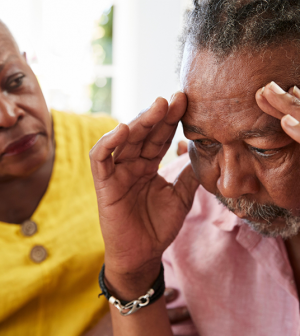- Could Your Grocery Store Meat Be Causing Recurring UTIs?
- Are You Making This Expensive Thermostat Error This Winter?
- Recognizing the Signs of Hypothyroidism
- 10 Strategies to Overcome Insomnia
- Could Artificial Sweeteners Be Aging the Brain Faster?
- Techniques for Soothing Your Nervous System
- Does the Water in Your House Smell Funny? Here’s Why
- Can a Daily Dose of Apple Cider Vinegar Actually Aid Weight Loss?
- 6 Health Beverages That Can Actually Spike Your Blood Sugar
- Treatment Options for Social Anxiety Disorder
Odds for Dementia Nearly Triple in the Year After a Stroke

A person’s odds for a dementia diagnosis nearly triple in the first year after a stroke, new research shows.
This post-stroke spike in dementia risk does subside with time, but it never returns to pre-stroke levels, the same report found.
“Our findings reinforce the importance of monitoring people with stroke for cognitive decline,” said lead researcher Dr. Raed Joundi. He’s an assistant professor at McMaster University in Hamilton, Ontario, Canada.
Joundi’s team will present its findings next week at the annual International Stroke Conference in Phoenix, sponsored by the American Heart Association (AHA).
In the study, the Canadian team combed through a database with information on more than 15 million people living in Ontario.
They looked closely at data on almost 181,000 people who’d recently suffered a stroke, and compared their health outcomes to those of matched controls. Controls were either healthy people without a history of stroke or heart attack or folks who’d had a heart attack but not a stroke.
Joundi’s group also tracked the incidence of dementia diagnosed within 90 days of a stroke, with follow-up continuing for 5.5 years.
They found that risks for a dementia diagnosis rose nearly three-fold during the first year after a stroke, then subsided to a 1.5-fold higher risk by the five-year mark. Risks were still slightly elevated even 20 years later, the team added.
Overall, 19% of stroke survivors developed dementia over the 5.5 years of follow-up, and survivors had a dementia risk that was 80% higher than that of the general population, or of that of people who’d survived a heart attack but hadn’t experienced stroke.
The type of stroke seemed to matter: People who’d survived an intracerebral hemorrhage (bleeding in the brain, a rarer form of stroke), were 150% more likely than the general population to develop dementia, the study found.
In fact, “we found that the rate of post-stroke dementia was higher than the rate of recurrent stroke over the same time period,” Joundi said in an AHA news release.
“Stroke injures the brain, including areas critical for cognitive function, which can impact day-to-day functioning,” he explained. “Some people go on to have a recurrent stroke, which increases the risk of dementia even further, and others may experience a progressive cognitive decline similar to a neurodegenerative condition.”
How can the risk for post-stroke dementia be reduced?
More effort needs to go toward “instituting appropriate treatments to address vascular risk factors and prevent recurrent stroke, and encouraging lifestyle changes, such as smoking cessation and increased physical activity, which have many benefits and may reduce the risk of dementia,” Joundi said.
Also, “more research is needed to clarify why some people who have a stroke develop dementia and others do not,” he added.
Because this data was presented at a medical meeting, the findings should be considered preliminary until published in a peer-reviewed journal.
More information
Find out more about stroke-related dementia at the Alzheimer’s Association.
SOURCE: American Heart Association, news release, Feb. 1, 2024
Source: HealthDay
Copyright © 2026 HealthDay. All rights reserved.










